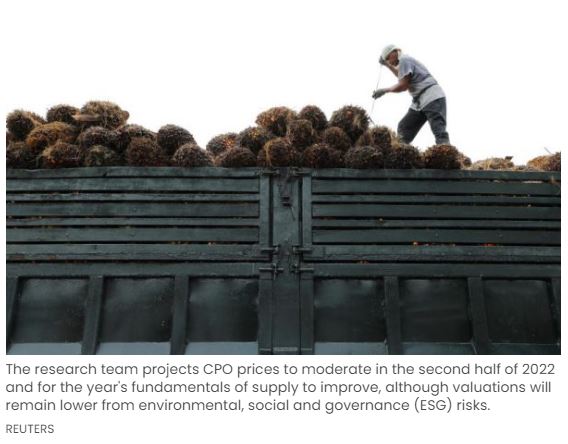Indian demand for Malaysian palm oil to moderate in 2022 from higher prices, domestic production: RHB
RHB has maintained its “underweight” call on Malaysia’s plantation sector with Indian palm oil demand likely to moderate as crude palm oil (CPO) prices remain high and India ramps up its own oilseed production, dampening import demand.
In a report on Wednesday (Jan 26), the brokerage said that the Malaysian Palm Oil Council (MPOC) expects India’s palm oil imports to drop 5 per cent to 8.2 million tonnes.
This is due to the currently high CPO prices and India’s higher oilseed production with a 10-15 per cent growth in rapeseed oil inhibiting demand, as well as current import duty structure favouring crude soya bean oil (SBO), which is currently around the same price as CPO, the brokerage added.
As SBO duty is 5.5 per cent, 275 basis points lower than the 8.3 per cent imposed on CPO, it is relatively cheaper to import SBO in India, RHB’s analysts added. Refined palm oil has a duty of 13.8 per cent.
The research team also projects CPO prices to moderate in the second half of 2022 and for the year’s fundamentals of supply to improve, although valuations will remain lower from environmental, social and governance (ESG) risks.
RHB thus expects that the “ESG discounts are here to stay, dampening investor appetite for plantation stocks”.
The brokerage noted that India’s demand for palm oil still has not reached pre-pandemic levels, with year-to-date November 2021 imports 13 per cent below the same period in 2019, while palm oil’s market share from the total edible oil imports is flattish at 61 per cent.
In addition, palm oil is commonly used by the industrial and hotel, restaurant and cafe sectors, with the latter heavily impacted by India’s restrictions due to a surge of Covid-19 cases. The research house sees these restrictions, including a ban on in-restaurant dining and 50 per cent capacity workforce, having an impact on palm oil demand in the country.
Rising inflation has also resulted in “soaring” edible oil prices and the government has taken various measures to curb it such as reducing import duties, imposing stock holding limits, as well as suspending trading of futures and options contracts for edible oils, oilseeds and agricultural products, the research team noted.
“India’s import duties on edible oils are the government’s main tool to reduce inflationary pressures, and changes to the rates have been occurring more regularly over the last year,” RHB’s analysts added.
Meanwhile, MPOC told RHB that it is “positive” on the Indian government’s potential to meet its long-term target to increase self-reliance for edible oils, having invested US$1.49 billion over a period of 5 years with a target to raise domestic production of CPO to 1.12 million tonnes by 2025-2026 and 2.8 million tonnes by 2029-2030.
Top sector “buy” picks include Bursa Malaysia-listed Sime Darby Plantation, Indonesia Stock Exchange-listed London Sumatra and Singapore Exchange-listed Wilmar International, while top “sell” stocks are Genting Plantations and FGV Holdings on the Malaysian stock exchange.
Source: https://www.businesstimes.com.sg/asean-business/indian-demand-for-malaysian-palm-oil-to-moderate-in-2022-from-higher-prices-domestic


 Thailand
Thailand




